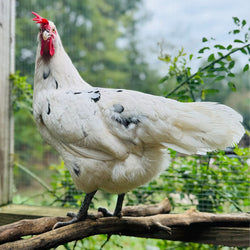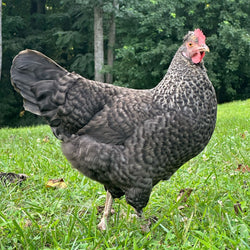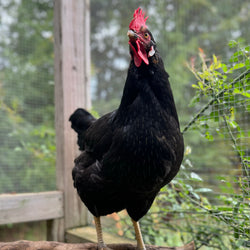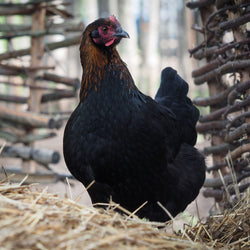page=2/--
Frequently Asked Questions
Here we answer the most commonly-asked questions about ordering, chicken care, and more.
Are fertilized eggs okay to eat?
Fertilized eggs are fine to eat, in fact some people claim they healthier than unfertilized eggs, although we've never seen any data supporting that. (Let's be honest; if the fertile egg is fresh and unincubated, you're going to have the addition of just half a cell.) Illustration by Ray Yang for My Pet Chicken It is impossible to taste the difference between a fertile and an infertile egg, and barely possible to SEE the difference between a fertilized and non-fertilized egg with the naked eye. If you look closely--and if you have good vision--you will see that a fertile egg...
Read MoreHow can I tell if my juvenile bird is a rooster?
Comb size and redness can be one indicator, but is not usually reliable. In fact, it's one of the worst indicators you can use, as comb size varies by breed and even individual. For instance, one of my hens has a larger comb than any of her sisters of the same breed, and a larger comb than any of my roosters, too. When sexing most juveniles, the best, most fail-safe method is to look at the saddle feathers in front of the tail when the bird is about 3 months old. By that age, cockerels will have long and pointy...
Read MoreHow do blue eggs become blue (instead of white or brown)?
Whereas the brown color of an egg is laid on the outside of the shell, the blue color actually goes all the way through the shell, even to the inside of the shell. Originally, it was thought that color pigments were synthesized in the blood by the breakdown of hemoglobin, but research shows it is more likely that they are actually synthesized in the shell gland pouch. The blue color is produced by biliverdin; the brown color is produced by protoporphyrin, and they are incorporated into the shell in different ways based on their different compositions. Again, to make it...
Read MoreMy chickens are 7 months old and I still haven't seen an egg. Why?
First, you should make sure they are on a good chicken feed. Once they have begun laying, switch to layer pellet or crumble; until then, feed them starter or grower. Some people make the mistake of feeding "scratch" only, when scratch is just meant to be a treat. Scratch in particular is mostly corn, which has very little nutritional value to it, and is low in protein. Feeding them scratch only would be like feeding your kids potato chips and corn chips only: it would simply not be very healthy! Second, some breeds do not come into lay until later...
Read MoreCan I use chicken manure in my garden?
Chicken manure makes great compost for fertilizing your garden. However, we recommend you compost it first: don't add it directly in quantity. Uncomposted chicken manure is very "hot": too much nitrogen can burn your plants. Once your manure is composted, it is great for your garden, however.Chicken manure does not acidify soil: it tends to raise the pH. Actually, one study demonstrates that chicken manure is as effective as lime in raising soil pH (making it more basic rather than more acidic). That same study shows that plants can absorb more calcium from the manure than from lime due to...
Read MoreWhat is the best way to wash and store my eggs?
It's counter-intuitive but true: Your eggs will stay fresher if you don't wash them at all. When your hens lay eggs, there is a natural coating that is laid on top called the "bloom" that helps keep out bacteria. When you wash eggs, you can drive some bacteria in through the pores of the shell, so it's a bad idea to do so unless needed just before cooking as a general practice. If your nests are clean, your eggs should be clean. In fact, fresh eggs don't really even need to be refrigerated if they're going to be used soon....
Read MoreIs there a way to tell if my chicken is happy or sad?
Chickens that are happy will be active and scratching around in the grass, laying in the sun--yes, they do that, too!--or taking a bath in the dirt. We don't recommend YOU try that chicken behavior--for humans, water baths tend to work a little better. Chickens, however, use dust baths to help keep themselves free to parasites. They also may be looking for a good, private place to deposit their eggs. Happy chickens who go broody will try to sit on their eggs all day to hatch them, and will protest if you try to encourage them to leave. If your...
Read MoreHow long do hens lay eggs ?
Chickens usually don't simply "stop" laying eggs when they get to a certain age, but they will lay fewer as they get older. That said, most laying breeds will lay more or less productively in backyard terms for five or seven years. (We know of one ancient Buff Orpington cross who still lays an egg occasionally at 17 years old!) There are a number of reasons your chickens might not be laying, so if you suspect there's something more to it than age, have a look at this list of other possible reasons your chickens aren't laying. Debunking the 2-year...
Read More







"The Clubhouse" Coop
Easy to assemble and built to last, the Clubhouse Coop is the perfect starter coop for a small flock.











